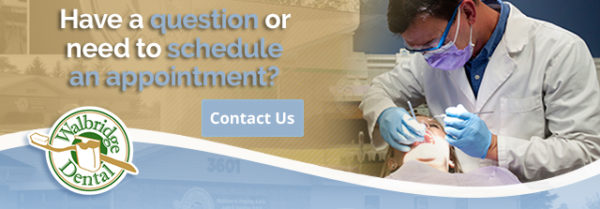
If you’re between the ages of 20 and 64, you’ve almost certainly experienced a dental cavity. According to the National Institute of Dental and Craniofacial Research, 92 percent of adults in that age range have experienced at least one cavity in their permanent teeth. But not all of them know the signs of a cavity!
Dental cavities, also known as dental caries, are a constant risk to your dental health. The sooner they’re treated, the better. Read on to learn the signs of a cavity and what you can do if you think you’ve developed one.
What Is a Cavity?
Your mouth is full of bacteria. No matter how often you brush, floss or use mouthwash, bacteria return to take residence in your mouth. As they feed off nutrients, primarily sugars, they leave behind acidic waste.
Teeth are tough – but they aren’t invincible. If you don’t take your dental health routine seriously, bacteria begin to form plaque and their acidic attack on your teeth will wear away at the surface. Over time, this erosion can continue until it reaches the roots of your teeth!
Even more severe is tartar. This forms when bacterial plaque is left to harden. Not only does tartar continue to assault your teeth and cause cavities, it makes it more difficult to remove and shields bacteria from brushing or flossing.
4 Common Signs of a Cavity
Sensitivity to Foods or Drinks
Cavities expose nerves that aren’t used to having direct contact with foreign substances. When a cavity has gone past the surface, you’re likely to get a “shock” of discomfort or pain when you drink something extremely cold or hot.
Not all cavities cause sensitivity, but the ones that do will typically respond to these potentially harmful types of foods or drinks:
- Extreme heat
- Extreme cold
- Acidic Substances
- Sugar
The pain can last anywhere from a moment to a few seconds and will return anytime your tooth is exposed to the extreme temperature. Severe pain from a cavity is a good indicator that it’s time to get to the dentist!
Pressure Pains
You don’t need to eat the “wrong” foods to trigger pain in a tooth suffering from minor or advanced decay! Many patients who develop cavities don’t discover them until they experience a recurring pain associated with biting or chewing. It can feel nearly impossible to eat!
Unlike sensitivity, pressure pains can happen with any type of food – or none at all! Simply clenching your teeth can be enough to trigger the nerve response.
Cavities are a common source of pressure pains but biting pains can also be caused by cracked or broken teeth. Regardless of what’s causing it, pain from pressure is a sure sign of trouble in your mouth.
Visible Holes/Pits in Your Tooth
Dental cavities aren’t always small! In fact, in some cases, you may see your cavity before you feel it. As cavities begin to form, they present themselves as a small white spot on your tooth. This can be difficult to notice at first, but that white spot will start to erode into a visible pit in the surface of the tooth.
Even if you can’t see it, the cavity can sometimes be identified by touch. If you feel around a sensitive part of your tooth and notice even a slight gap, it’s a good sign of a cavity.
In most cases, teeth should be relatively smooth to the touch. Be careful, touching a cavity could cause pain!
Pus
Bacteria won’t stop after causing a cavity. Plaque and tartar build-up only grow worse, and eventually that cavity can develop into a dangerous bacterial infection. One side-effect of your body’s attempt to fight infection is pus, and it can be incredibly unpleasant to find in your mouth.
If you taste or notice pus in your mouth, chances are that your cavity has advanced into a tooth abscess. Unlike a cavity, which can be typically cleaned and filled, a tooth abscess requires immediate attention. An infection in your mouth can have a domino-effect on your health – especially if the infection branches out toward your brain!
What to Do When You Notice the Signs of a Cavity
You can’t reverse a cavity at home, but you can take steps to help slow the damage. Improving your dental health routine is the first and most important step. If you aren’t brushing and flossing every day, now is the time to start!
Before bacteria forms into plaque or tartar, it’s relatively easy to brush away. Food particles in your mouth are also important to clean away, as they provide sustenance to bacteria that will accelerate decay.
However, the most important thing to do when you identify a cavity is to schedule a dentist appointment. No matter how much you do at home, you can’t clean and fill a cavity yourself. The sooner your dentist can treat your cavity, the more likely you are to avoid the more severe symptoms of a cavity. You’ll also lower your chances of a dangerous infection!
Risk Factors That Increase Cavity Likelihood
Some people are more prone to cavities than others, often due to lifestyle or biological factors. Poor brushing and flossing habits are a big one, especially if plaque is left to build up over time. A diet high in sugar or acidic foods can also wear down enamel and give bacteria more fuel to work with.
Other risk factors include dry mouth, which reduces the saliva needed to help wash away food and neutralize acids. Some medical conditions or medications can lead to dry mouth, putting you at greater risk. Deep grooves or pits in the teeth make it easier for bacteria to hide, and if you have dental appliances like braces or dentures, they may also make thorough cleaning more difficult.
How Dentists Diagnose Cavities (e.g. x-rays, probing)
Cavities aren’t always obvious just by looking at your teeth in the mirror. Dentists use a few different methods to catch signs of tooth decay. During your regular check-up, your dentist will visually inspect each tooth, looking for visible discoloration, pits, or soft spots.
They may also use a dental explorer – a small metal tool – to gently probe the surface of your teeth. A sticky or soft area may indicate decay. X-rays are another helpful tool that can reveal cavities forming between teeth or underneath the surface, especially in spots that aren’t easy to see during a regular visual exam.
Preventing Cavities – Foods and Habits to Embrace
Cavity prevention starts with good daily habits. Brushing your teeth twice a day with fluoride toothpaste and flossing once a day are the basics, but there’s more you can do to keep decay at bay.
Choose foods that are low in sugar and high in fiber, like crunchy vegetables and whole grains. Drinking plenty of water – especially fluoridated water – helps rinse away food particles and keep your mouth hydrated. Dairy products like cheese and yogurt can also help protect enamel thanks to their calcium content.
And don’t forget your regular dental check-ups. Professional cleanings help remove plaque buildup in hard-to-reach areas and give your dentist a chance to catch any early signs of trouble.
Do You Have Dental Health Questions? Schedule an Appointment!
We can help make sure you and your family are brushing correctly. If you’re concerned or just looking for information, the professionals at Walbridge Dental provide complete family dental care to families in the Millbury community. Contact us online to set up an appointment now or call us at 419-836-1033.
Connect on Social Media!

